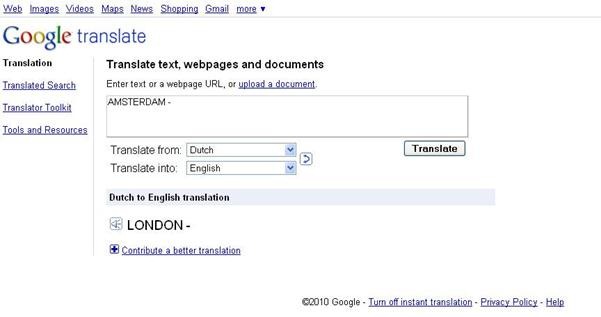After reading the post about Google Translate that is written by Darren. I would also like to write a post about the problems that occur in this translating machine. I think most of us would agree that Google Translate is not a professional translator after experiencing its function. Google Translate always create some funny translations that the users can easily get the false information.
searchenginepeople.com has listed out some examples:
Google Translate Loves CanadaGoogle Translate went through a bit of a learning curve with such things as place names, language names and other national signifiers. What makes this one special is the particular choice that Google made in its translation. Its obviously unthinkable for anyone to love England or the United States of America or any other English-speaking country " apart from Canada.
Google Places Too Much Emphasis On ContextNo Google, sentences about the city of Amsterdam are not in fact the same as those about London, even if you change the language. We can see some people being very surprised when they read about the picturesque canals of London " just a stones throw from the marijuana cafs and legalized prostitution Similarly, just because Google can easily switch from language to language, it doesnt mean that we can.
I think Google Translate wanted to use domestication in these examples. However, it was using the wrong approach. The name of a country or a city is a piece of important information. Using domestication may mislead the readers and lose the meaning of translation. A possible explanation for this translation is that it was affected by the location setting of the website, i.e. if the person set his location in Canada, he will get Canada as the translation of Sweden. Or maybe the passage is right, Google has a favourite.
Gotta Catch Em llIt would be amazing if German children just opened their mouths and screamed when discussing the phenomenon that is Pokemon " its certainly what a lot of kids do, even though its not an actual word. Sadly, this isn't quite the case. Rather, it seems that Google was the victim of some internet pranksters, who continually suggested pokemon as the translation for , until Google software thought it was correct.
Seems like Pokemon is big hit in French. How can you expect that äääääääääääää in German actually means pokemon in French? According to the passage, this happened because there were many people on the internet suggesting that äääääääääääää meant pokemon. This shows that netizens can easily alter the result of Google's translation. Therefore, people cannot get the accurate meaning from Google Translate as it gives out false information.
Google Thinks The French Are FilthyThe French have a certain reputation for Don Juan-like tendencies. It must be something about the thin mustaches, or maybe the accent. Google seems to take a dim view of this carry-on, believing that the slightly risqu English request to take a dirty picture for me would be a much more forceful, if not downright rude, take a picture for me slut when coming from a Frenchman.
Google Seems To Have Inside InformationGoogle Answers may be gone, but you can still ask Google the pressing questions in life. In response to that worry of teenage girls everywhere, Will Justin Bieber ever hit puberty, Google replies (in Vietnamese), Justin will never reach puberty. Adding in a question mark leads Google to respond with a question of its own, apparently shocked by its own interpretation: Justin will never reach puberty?
We learnt about back translation during our lesson. It means translating a translated word into its original meaning. Google Translate might not learn this before. It showed a completely different meaning when people used it to do the back translation. Or, as the passage mentioned, Google was trying to reveal some secrets?
Google Hates FacebookIt isn't really news that the two internet giants have a certain antipathy towards each other " after all they are competitors of sorts and there's some history of bad blood. However, this dislike seems to have seeped into every aspect of Google being, with the simple translation of I HATE YOU being hijacked into a diatribe about Facebook in Japanese. Apparently Google thinks that the true meaning of hate is I have to use your Facebook.
I laughed so hard when I saw this. How can the translation show the information that is absent from the original text? I am starting to be confused of how this translating machine works. Wait, take a look at the following example:
Samsung Must Be Friends With GoogleEither Samsung and Google are the best of friends or Samsung just got very, very lucky. Thanks to some awkward translations, Samsung got a jump up ahead of the competition in Romania. Anybody who was trying to translate an English product review about Motorola products would instead find the text extolling the virtues of Samsungs offerings when they read it in Romanian.
Told you. Google practices favouritism.
Read more on: http://www.searchenginepeople.com/blog/10-google-translate-fails.html

Nice post! This is a very nice blog that I will definitively come back to more times this year! Thanks for informative post.
ReplyDeleteTranslation services near me
Thanks a lot for sharing this amazing knowledge with us. This site is fantastic. I always find great knowledge from it. French to English Document Translator
ReplyDelete